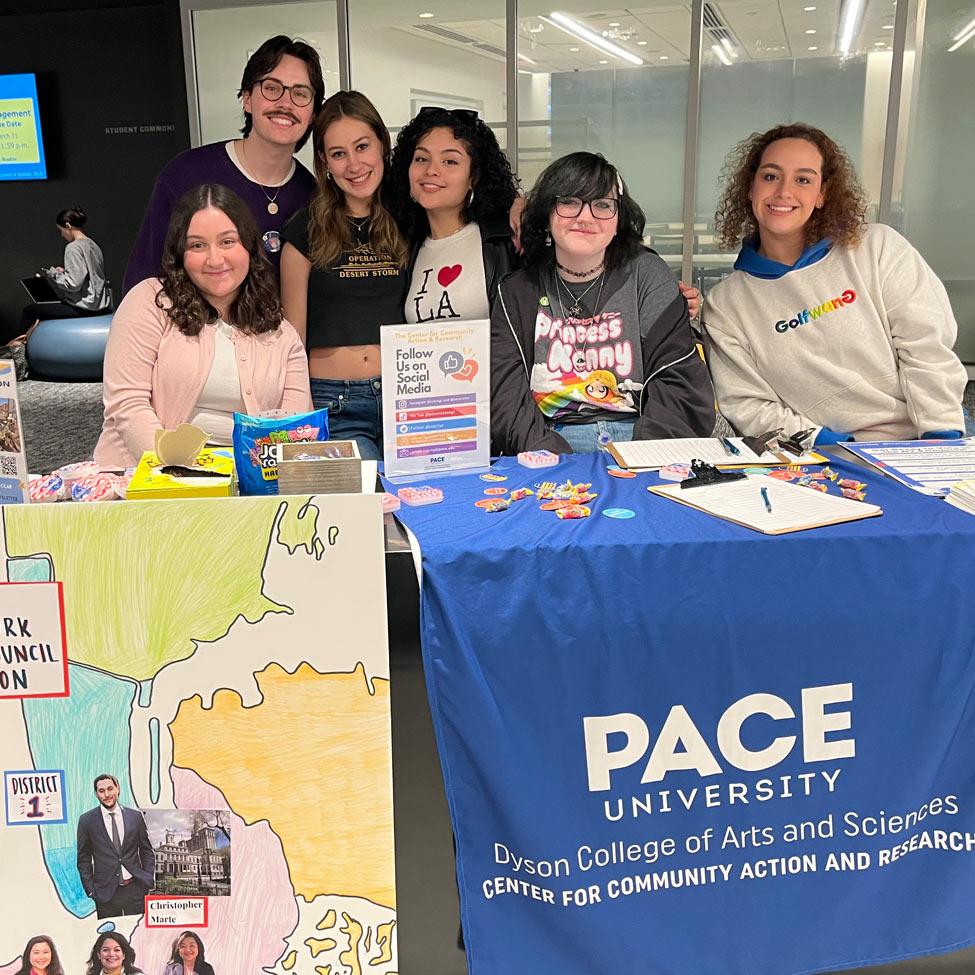
A Shooter's Parents Were Convicted of Manslaughter. What Happens Next?
Elisabeth Haub School of Law Professor Linda Fentiman speaks to The New York Times about the prosecution of James and Jennifer Crumbley that could affect the courts and parenting in the wake of the worst school shooting in Michigan history.
Pace University And The “Pace Difference,” Real-World Learning With A New York Advantage
Pace President Marvin Krislov and Vice President for Enrollment and Placement, Robina Schepp are featured on the Visionary Voices: The College President’s Playbook podcast series. Together, they provide insights into how Pace University embodies "The Pace Difference" and drives its commitment to student success.
Redefining Voting Access for Pace Students
New York legislation has paved the way for easier voting access among college students. Discover how Pace students benefit from this game-changing law, get registered to vote, and leverage campus resources for active participation in democracy.
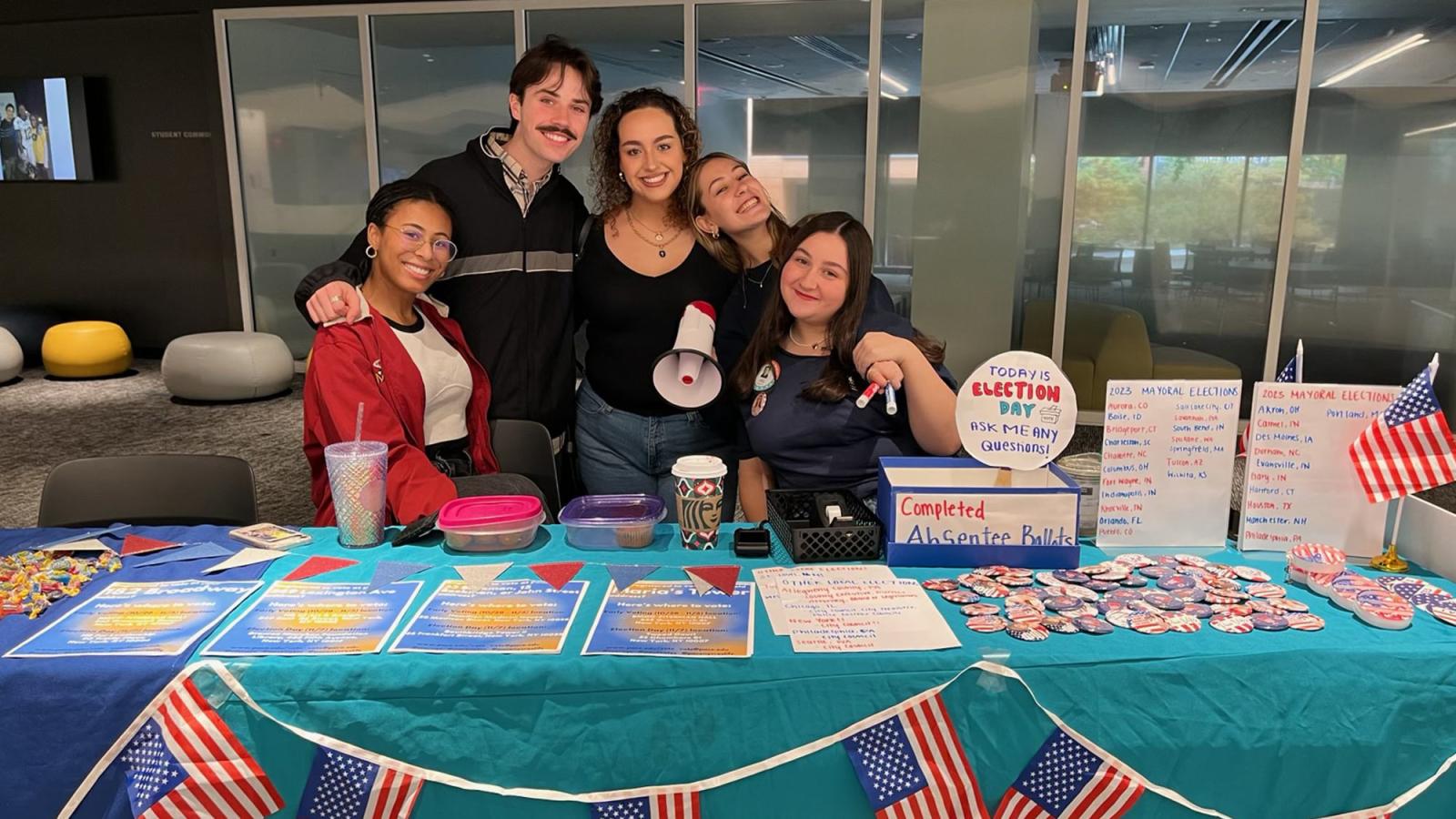
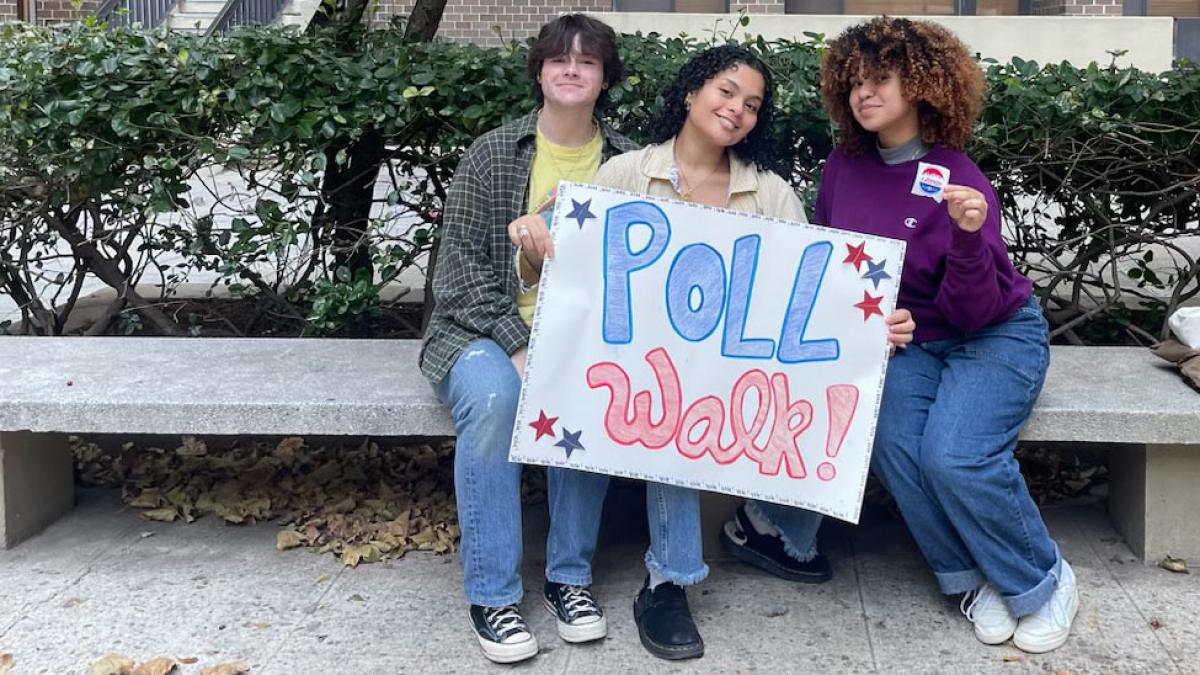
On April 2, for the first time ever, Pace students will have the opportunity to cast their votes directly on campus. Thanks to the diligent efforts of student leaders and organizations like the Center for Community Action and Research (CCAR), the Student Center at One Pace Plaza in NYC and Willcox Hall in Pleasantville will serve as the designated polling place for the New York Presidential Primary. This development marks a significant milestone in enhancing voter accessibility and engagement among college students.
CCAR student leaders, supported by the Andrew Goodman Foundation, have tirelessly advocated for this change to address the challenges faced by residential student voters. Despite high voter turnout rates among Pace students, logistical hurdles such as split polling places have hindered full participation. Now, with the establishment of an on-campus polling site, students can easily exercise their voting rights without the hassle of navigating multiple locations.
“Finding and getting a voting site can be difficult and filled with unforeseen bumps along the road. Having a campus voting site finally accomplishes for Pace students what student voters across the nation have been wanting for years–accessibility right at their front door.”
The significance of this achievement extends beyond the Pace Community. It aligns with a statewide initiative following the 2022 law mandating on-campus polling places for institutions with over 300 registered voters, aiming to eliminate campus gerrymandering. Through collaborative efforts with organizations like the Andrew Goodman Foundation and ALL IN Campus Democracy Challenge, CCAR is part of a broader network advocating for increased on-campus voting options across New York.

Assistant Director of CCAR Erin Mysogland emphasizes the importance of making voting accessible and enjoyable for students in a recent Inside Higher Ed article. With the convenience of voting in between classes or with friends in the familiar setting of the Student Center, barriers to participation are lowered, fostering a culture of civic engagement.
“It’s where most student events are, most big lectures,” she said. “For us, our consideration was, this is where students are used to going to events, fun events, events for class, so this helps fold it into their normal day.”
Jasmine Cintron, one of CCAR's Andrew Goodman Foundation Ambassadors, underscores the significance of accessibility. “Finding and getting a voting site can be difficult and filled with unforeseen bumps along the road. Having a campus voting site finally accomplishes for Pace students what student voters across the nation have been wanting for years–accessibility right at their front door.”
The process of establishing the on-campus polling site has been meticulous, involving thorough inspections by the Board of Elections to ensure compliance with accessibility standards and logistical requirements. From testing Wi-Fi connectivity to measuring indoor and outdoor spaces, every detail has been carefully considered to guarantee a seamless voting experience for Pace students.
In essence, the introduction of an on-campus polling place represents more than just a logistical achievement; it symbolizes a commitment to democratic principles and the empowerment of student voices. By removing barriers to participation and fostering a culture of civic responsibility, Pace University sets a precedent for universities nationwide, demonstrating the transformative impact of prioritizing student engagement in the democratic process.
Get Registered to Vote
All residential students have the right to register to vote either with their residence hall address or with their home address. If you’re planning on voting in the New York Presidential Primary, you must be registered by March 23. Pace students can register online to vote in any state, at an upcoming CCAR event, or by visiting the CCAR office on their campus:
NYC Campus
41 Park Row, Room 404
Pleasantville Campus
Choate House, Room 51W
Developing a Dazzling Business
Many first-year students focus on adapting to their new college environment, but Isabella Betancourth jumped right in, going after opportunities that would make her a better business owner. From joining the Entrepreneurship Club to using on-campus resources to learn about strong business practices, Isabella is on the right path to grow her business, Isabella’s Jewels – and she’s just getting started.


Isabella Betancourth
Class of 2027
Currently Studying: BBA in Finance
Member Of: Entrepreneurship Club
Pronouns: She/Her
Many first-year students focus on adapting to their new college environment, but Isabella Betancourth jumped right in, going after opportunities that would make her a better business owner. From joining the Entrepreneurship Club to using on-campus resources to learn about strong business practices, Isabella is on the right path to grow her business, Isabella’s Jewels – and she’s just getting started.
Why did you choose Pace University and the Lubin School of Business?
Growing up in New Jersey, I constantly visited Manhattan, which led me to fall in love with the city. There are so many fun things to do and places to discover, so it was a no-brainer to continue my studies at Pace University. As for studying at Lubin, attending a business school that is well known for preparing their students for the real world was important to me.
Most of all, being in the heart of the Financial District as a finance major is incredible, and I can’t wait for the opportunities I will have over the next few years.
How have clubs on campus helped enrich your student experience?
So far, I’ve joined the Entrepreneurship Club, which really spoke to me and my passions. This club has introduced me to Pace University’s Small Business Development Center and Pace Entrepreneurship Studio here at Pace - both of which I’m excited to start working with and use their resources to grow my business.
Tell us about your business, Isabella’s Jewels.
Isabella’s Jewels is a fine jewelry company featuring 925 Sterling Silver and 14k gold vermeil pieces. Our website features a high-quality curated collection of trendy and timeless accessories at an affordable price point. Isabella’s Jewels pieces are designed in New York City and imported from Italy, ensuring that each piece is not only a style statement but also a lasting investment intended for everyday wear. Our pieces are available online, as well as through pop-up events through partnerships with small businesses such as boutiques, salons, and workout studios across New Jersey and New York.
What motivated you to launch Isabella’s Jewels?
I’ve always been very entrepreneurial - it’s how I express my creativity. Ever since I was young, I would launch little businesses that revolve around the latest trends. It went from selling handmade rainbow loom bracelets, stickers, and lip scrubs in my elementary school years to shipping hundreds of custom college apparel pieces across the country through my last business, Icon Sweats. Using my experience and funds from four years of growing Icon Sweats, I decided I wanted to start something new and chose jewelry, something every woman wears and loves.
How have your classes at Lubin helped you grow your business even further?
Although I only just finished my first semester here at Pace, my professors and the courses I’ve had have helped me strengthen the business foundation I already had. I’ve been able to use the concepts I’ve learned to make better business decisions. Mastering Excel spreadsheet skills in my Intro to Computing course has also made a big impact. Excel has helped me organize my business materials and inventory in a way I had not been introduced to before!
What has been your favorite opportunity at Pace?
Being on the Dean’s List with first honors after my first semester was amazing. Hard work pays off! Also, this experience - having a profile written on me for the Lubin School of Business - is such an honor. I’m grateful for the recognition and support that Pace University is giving me and my business.
Do you have any advice for other Lubin students?
Follow your dreams, stay focused, and make connections. People from all over come to New York City to pursue their dreams. There are so many opportunities and resources here, and you should go for it. Stay focused, show up to class, and take your coursework seriously because there are no do-overs once these four years pass. Most importantly, make connections. You are in the business capital of the world, and the people you know can make a difference in your career.
What does #LubinLife mean to you?
To me, #LubinLife means embracing the community around you at Pace University in order to succeed. Students appreciate learning from their diverse classmates, taking advantage of the business opportunities around them, and challenging themselves in order to grow into better people and professionals.
Connect with Isabella:
The Psychologist-Artist: Founder of New York School of the Arts Betsy Lawrence '95, PsyD, Uniquely Merges Art and Helping Others
Betsy Lawrence '95, PsyD, intertwines psychology and the arts, founding the New York School of the Arts while balancing a unique career and leaving a lasting impression on her community.
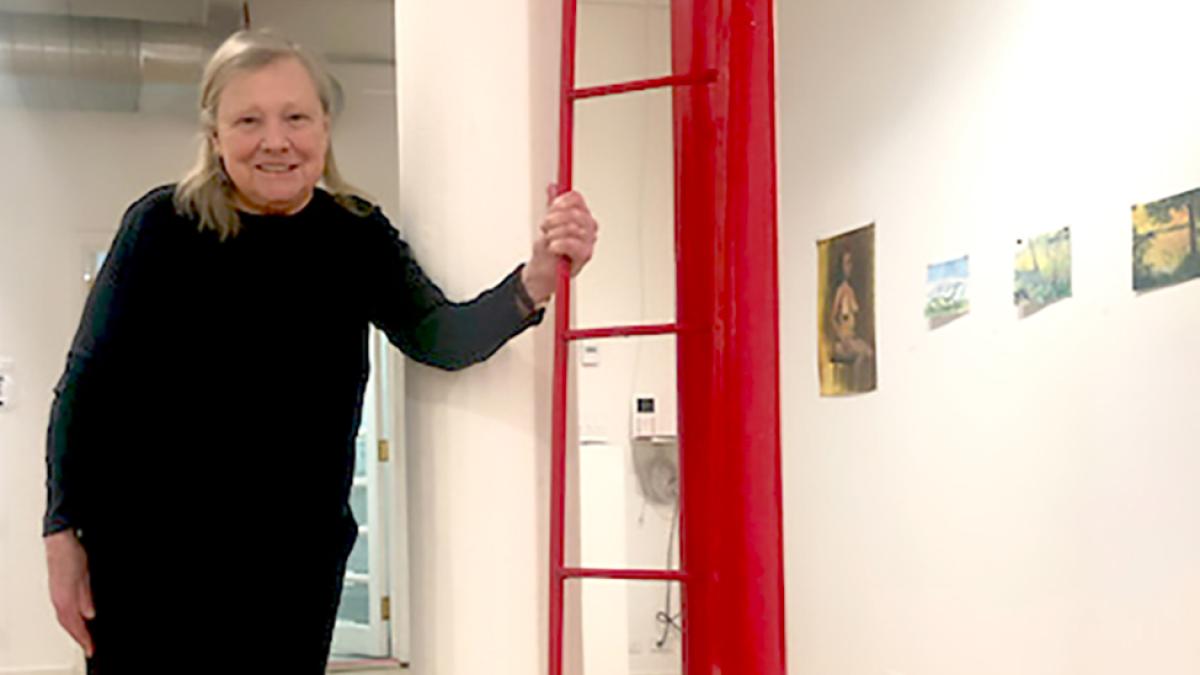
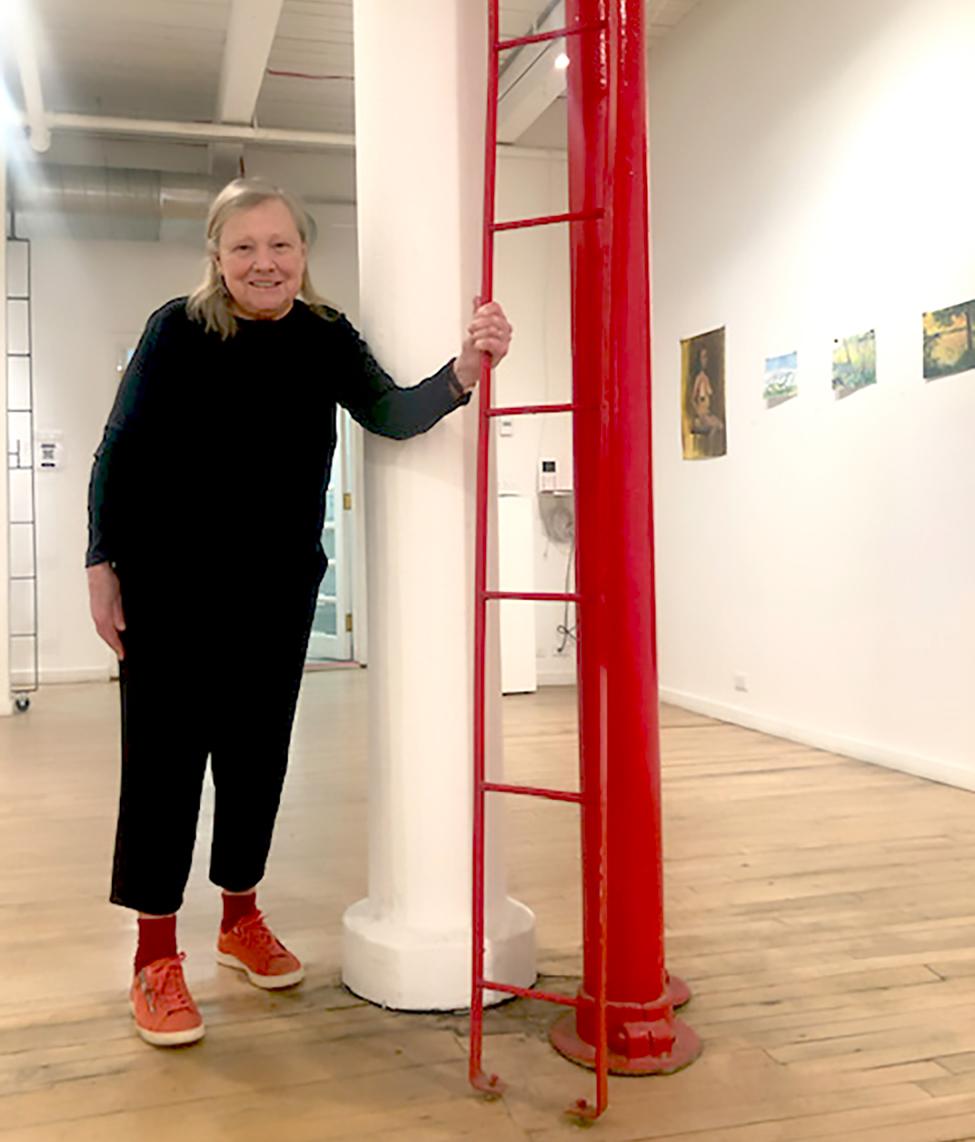
Betsy Lawrence ’95, PsyD, has had a hunger for learning ever since she was a child, a quality that would propel her throughout both her personal life and her extraordinary dual career as a psychologist and psychoanalyst, as well as founder and president of New York School of the Arts (NYSA), a not-for-profit arts school and cultural center in New York City.
In the early years of her education, classes in art and mathematics that interested Lawrence were not largely available. With college on the horizon, she also faced a lack of precedence in her family of women attending higher education, let alone earning a doctorate. However, Lawrence’s deep desire to learn–and to help others with that knowledge–coupled with meeting supportive people along the way guided her to achieve an education that supported her dreams and passions.
Early training
Lawrence’s entry into the field of psychology was completely unexpected.
With an undergraduate degree in both Greek and Latin, and master’s in childhood special education, it was during her work teaching language and reading to children with special needs at St. Luke’s Hospital in Manhattan that she first encountered psychologists and psychiatrists. It was at a time during which terms such as dyslexia and attention deficit disorder were relatively new, and many questions existed in the medical community on treatment. Lawrence was both concerned and curious; she saw young patients placed on medication and wanted to delve deeper, to know more. It was then that she decided to become a child psychoanalyst.
Lawrence attended evening classes as part of the School-Clinical Child Psychology PsyD program at Pace, one she was drawn to because of its flexibility and dual focus. Over the years, she would work closely with her faculty mentor, Barbara Mowder, PhD, leading to a dissertation on educators’ perceptions of parental roles, and put theory to practice in externships, most prominently at Mount Sinai Medical Center in Manhattan, where she also did a post-graduate fellowship in neuropsychology. It was an exciting time and she felt that her mind could grow with the supportive foundation she found at Pace.
“I think that if you ask students, they will agree that Pace faculty are very, very open to ideas,” said Lawrence. “Sharing is encouraged, and people here tend to have a good heart, too. You didn't have to pretend you knew everything. There was help, and this was really quite special.”
She holds fond memories of students supporting each other based on their own strengths: for example, Lawrence would be approached by the more mathematically-inclined students for assistance with writing (a skill which she highly credits another New York Psychology department faculty mentor, Florence Denmark, PhD, with helping her to develop), and they, in turn, would guide her on numbers-based research that was a key part of the program.
Creating opportunities
Although Lawrence would go on to a successful career as a psychologist and psychoanalyst, including in private practice guiding parents through their children’s developmental stages, she was ever an artist at heart. She enrolled in an intensive art program at the historic National Academy, an art school, museum, and association of professional artists in Manhattan near her work. A dark reality, however, had loomed: the school’s closure, and with it, job losses for the director and as many as 40 faculty.
It was a unifying neighborhood staple, and she could not simply stand by idly.
Lawrence knew both artists and individuals familiar with buildings in Manhattan. So, with a combination of drive, a can-do spirit, and a bit of luck, she worked quickly to open a new institution for the art community to continue, the New York School for the Arts. Through it, she has been able to provide others with what she always deeply wanted for herself: the chance to realize their unique artistic talent, something she feels everyone possesses and just needs to be nurtured.
She describes it as a “magical place” where one can palpably feel the creative process within which others are engaged and to be in this “extraordinary walk” with them. (Some patrons have even shared with Lawrence that her school’s pivoting to online learning during the COVID-19 pandemic, followed not long after by a resumption of classes, had “saved their life”).
Just as an expression of ideas was so openly encouraged in her days as a Pace student, at NYSA, the faculty, diverse and esteemed professionals in their own right, provide students with ideas on experimentation—for example, on how to work with materials—then allow them the space to take that where they wish to. There is also another similarity to Pace: the small classroom sizes encourage a more social, collaborative environment.
“I was good at art. I just didn’t have the opportunity to do it. But it doesn’t mean that, because you haven’t done it, you can’t,” she said. “You never stop learning.”
The liberal arts in life
Today, Lawrence’s psychology practice is part-time, and so she has been able to devote more energy to her artistic endeavors. She now sees herself as, first, a watercolor artist, and second, a sculptor, working with terracotta to bronze. Thematically, she loves to incorporate the mythological as well as symbolism in her art, as she feels that stories in literature have as much relevance today as in the past.
She also credits her background in Greek and Latin as giving her a greater appreciation for these stories, as well as being able to read “almost anything” due to the roots of words of ancient languages finding their way into more modern ones and modes of expression.
“All these wonderful arts—including languages—just bring people together.”
Giving back
Today, we can also find Lawrence giving back to her community in another, unexpected way.
An award-winning sailor, she and her husband have found a way to help veterans of war with Post Traumatic Stress Disorder (PTSD) heal from their trauma with the use of sound and movement from wind created by sails. Working with several foundations, it was simply an idea inspired by her psychological training at Pace that launched and has made a real difference in people’s lives.
Lawrence, who credits sailing as teaching both self-reliance and teamwork, takes the opportunity to use maritime language to similarly reflect on her days as a Pace student:
“I'm a sailor. I got on the boat, and it was the right boat, and we sailed together.”
Elisabeth Haub School of Law at Pace University Hosts Successful 2024 Regional Round for the Americas and Caribbean of the International Criminal Court Moot Court Competition
On March 9–10, 2024, the Elisabeth Haub School of Law at Pace University hosted the 2024 Regional Round for the Americas and Caribbean of the International Criminal Court Moot Court Competition (ICC Moot).
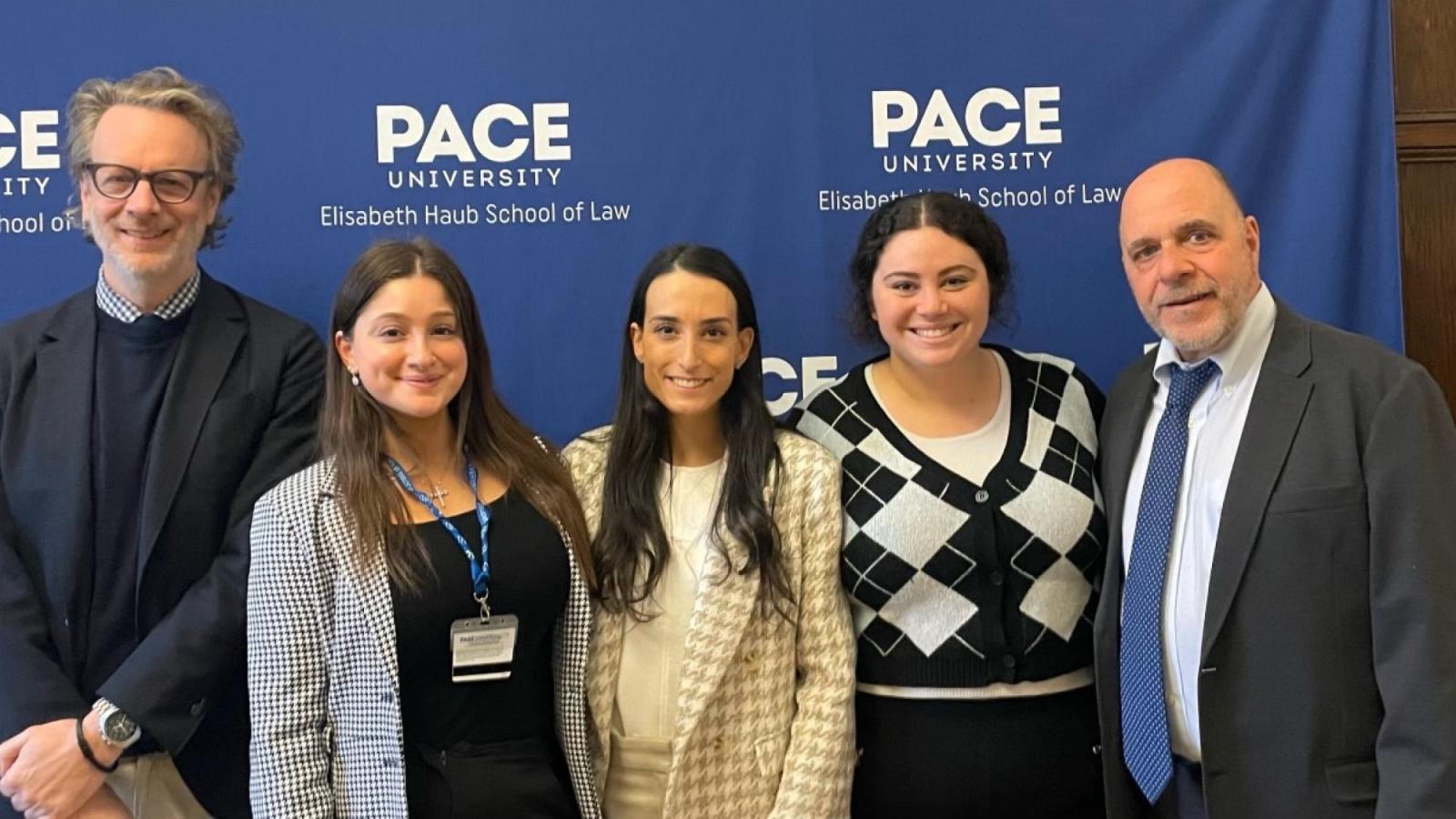
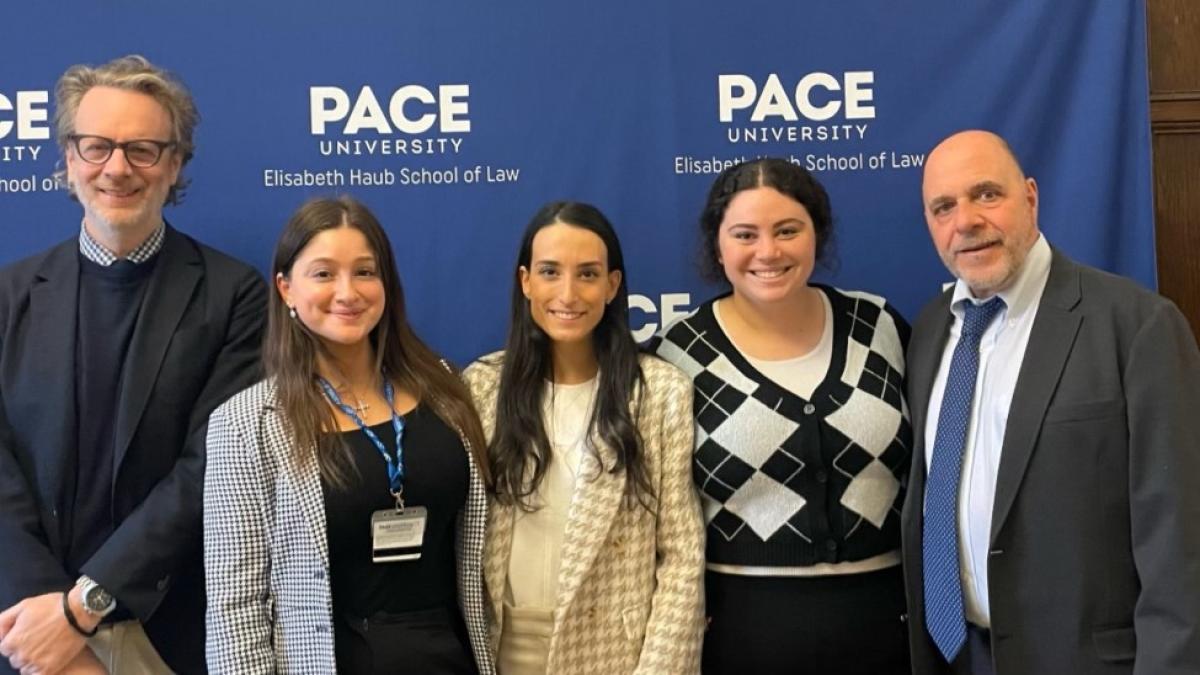
On March 9–10, 2024, the Elisabeth Haub School of Law at Pace University hosted the 2024 Regional Round for the Americas and Caribbean of the International Criminal Court Moot Court Competition (ICC Moot). The event brought nine teams to Haub Law, with the top five US teams qualifying for the global ICC Moot Court Competition held annually in The Hague, Netherlands. The team from the University of Chicago College achieved a first-place finish in this Regional Round, with Georgetown University Law Center finishing as runner up, and William & Mary Law School also participating in the final round.
“The ICC Moot is a wonderful and unique moot court competition unlike any others,” said Professor Alexander K.A. Greenawalt, who serves as faculty director of the Moot. “Haub Law founded the competition from its inception as a classroom simulation and though it has evolved over time, we still have the honor of hosting a significant regional qualifying round for the global competition that takes place in The Hague each year.” This year, the five top US teams were the University of Chicago College, Georgetown University Law Center, William & Mary Law School, Tulane University School of Law and the University of Miami School of Law. These top five teams all qualified for the International Criminal Court Moot Court Competition to be held in June in The Hague. The Canadian team from Osgoode Hall Law School, York University will also compete in The Hague.
The Elisabeth Haub School of Law at Pace University also had a team competing in the Regional Round. The Haub Law team consisted of Jordan Thompson, Marina Fedak, Houston Porter, Nick Kryza and Samara Pizzaro. While the Haub Law team did not advance, team member Marina Fedak won second place for ‘Best Preliminary Round Oralist – Prosecution' and Jordan Thompson’s brief tied for second place for ‘Best Victims’ Advocate Memorial.’
Haub Law’s nationally ranked trial advocacy program includes teams of students who help to facilitate and run competitions, such as this, held on campus. The internal competition directors for the Regional Qualifying Round held on March 9–10 at Haub Law included students Sarah Kissel, Amanda Dinkin and Maggie Minas. “The opportunity to be involved in such a prestigious and global competition as the ICC Moot is a once in a lifetime experience,” said Sarah Kissel.
The ICC Moot was first organized in 2004 by Haub Law Professor Emeritus Gayl S. Westerman and Matthew E. Brotmann. At the time, the ICC moot was the world’s first moot court competition based on the law and procedures of the first permanent international tribunal dedicated to the prosecution of international criminal offenses. Since 2004, the International Criminal Court (ICC) has grown, and the Competition has grown with it. As such, in 2014, Haub Law partnered with the International Criminal Court and the Grotius Centre for International Legal Studies, Leiden University to become part of the global competition, the ICC Moot Court Competition, which is held annually in The Hague, Netherlands, with the final round judged at the ICC itself by ICC judges and legal officers. More recently, in 2017, the ICC Moot started its collaboration with the International Bar Association (IBA), and in 2020 the IBA became a name partner in the Competition. The unique and prestigious annual competition at Haub Law now serves as a Regional Qualifying Round for that global competition.
2024 Regional Qualifying Round for the Americas and Caribbean results
Best Overall
- University of Chicago
- Georgetown University Law Center
- William and Mary Law School
Best Preliminary Round Oralists - Prosecution
- Mahek Punjabi, Osgoode Hall Law School, York University
- Marina Fedak, Elisabeth Haub School of Law at Pace University
- Marie Ardy, University of Chicago
Best Preliminary Round Oralists - Defense
- Matthew Grabainski, Georgetown University Law Center
- Abigail Wettstein, University of Miami School of Law
- Isabella Grundseth, University of Chicago
Best Preliminary Round Oralists - Victims' Advocate
- Charlotte Markstein, Tulane University School of Law
- Anna Guzman, University of Chicago
- Alicia Barry, Georgetown University Law Center
Best Prosecution Memorial
- First: University of Chicago
- Second: Tulane University School of Law
- Third: Osgoode Hall Law School, York University
Best Defense Memorial
- William and Mary Law School
- University of Chicago
- Osgoode Hall Law School, York University
Best Victims' Advocate Memorial
- University of Chicago
- Second (TIE):
- Osgoode Hall Law School, York University
- William and Mary Law School
- Elisabeth Haub School of Law at Pace University
Semifinalists teams
- Georgetown University Law Center
- Osgoode Hall Law School, York University
- Tulane University School of Law
- University of Chicago
- University of Miami School of Law
- William & Mary Law School
Participating Teams
- Barry University, Dwayne O. Andreas School of Law
- Case Western Reserve University School of Law
- Elisabeth Haub School of Law at Pace University
- Georgetown University Law Center
- Osgoode Hall Law School, York University
- Tulane University School of Law
- University of Chicago
- University of Miami School of Law
- William & Mary Law School
Distinguished Lawyers and Alumni Honored at the Elisabeth Haub School of Law’s 29th Annual Law Leadership Dinner
The Elisabeth Haub School of Law at Pace University honored three distinguished leaders of the legal community, as well as outstanding alumni, during its 29th Annual Law Leadership Dinner, held at the Westchester Country Club on March 14, 2024. More than 240 alumni, faculty, students, elected officials and members of the judiciary, and distinguished lawyers attended the celebration, raising vital funds in support of student scholarships, faculty research, and innovative programs.
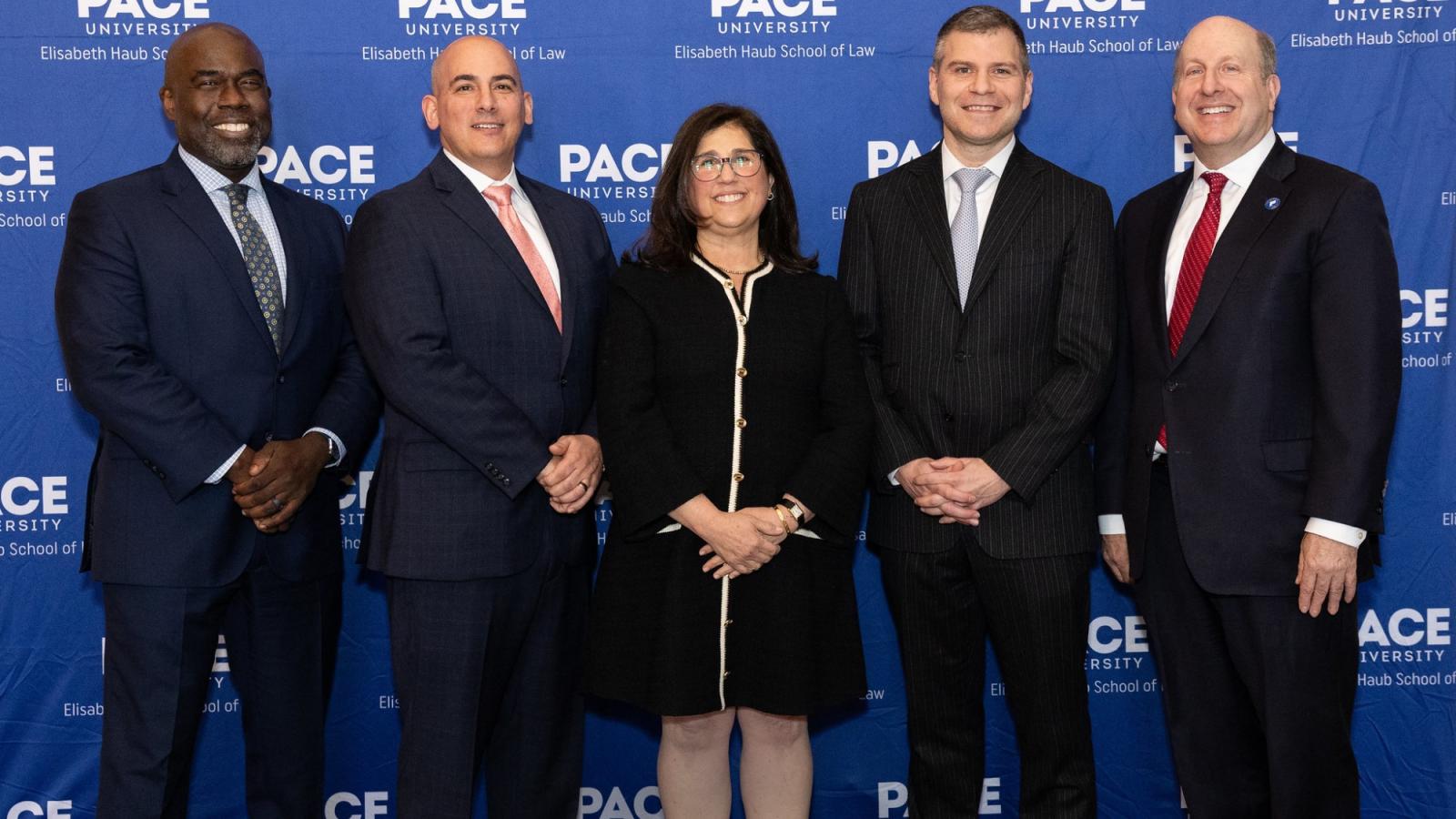
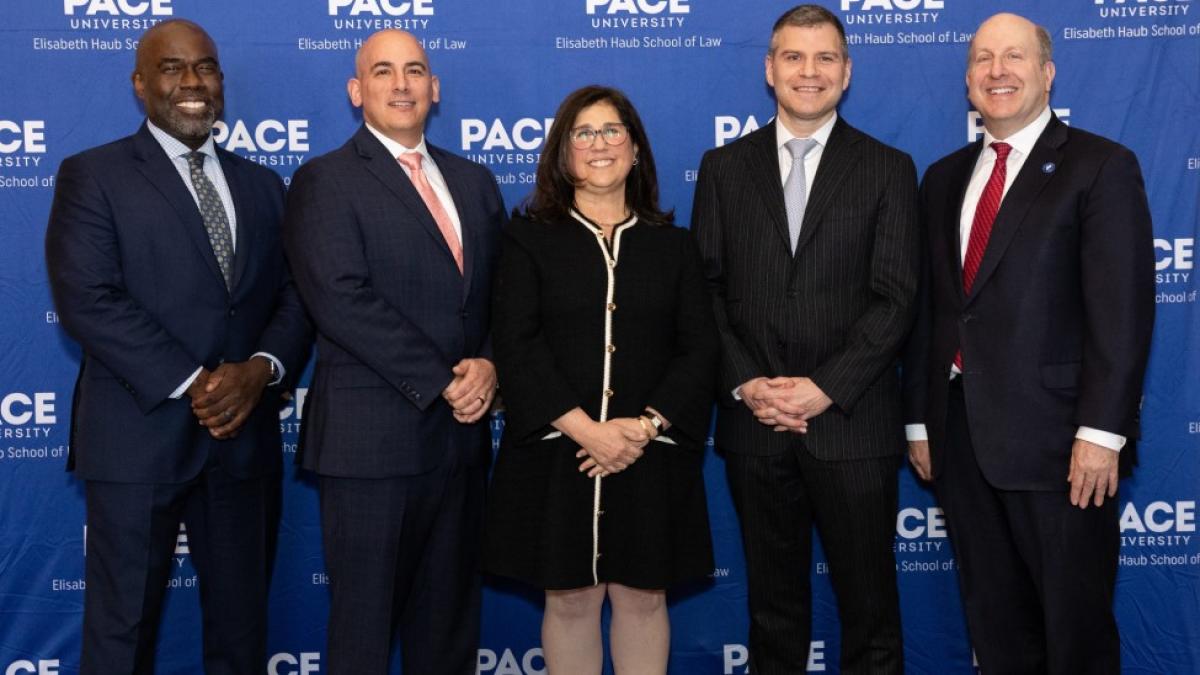
The Elisabeth Haub School of Law at Pace University honored three distinguished leaders of the legal community, as well as outstanding alumni, during its 29th Annual Law Leadership Dinner, held at the Westchester Country Club on March 14, 2024. More than 240 alumni, faculty, students, elected officials and members of the judiciary, and distinguished lawyers attended the celebration, raising vital funds in support of student scholarships, faculty research, and innovative programs.
The Law Leadership Dinner, first held in 1995, is the signature fundraiser for Haub Law and provides the setting for the presentation of the Distinguished Service Award, which honors individuals or organizations that have made outstanding contributions to the legal community. Additionally, the Shining Star Award recognizes up-and-coming Haub Law alumni in all areas of legal practice who have made significant contributions to the profession, their organizations, and the community early in their careers. This year, the Law School introduced the Visionary of Justice Award, created to honor individuals who raise awareness about human rights concerns, and/or motivate the initiation of social justice efforts within their communities.
This year’s Master of Ceremonies was Board of Visitors member and alumna Susan E. Galvao ’93, Co-Managing Partner, Bleakley, Platt & Schmidt, LLP. Both Horace E. Anderson, Jr., Dean of the Elisabeth Haub School of Law and Pace University President Marvin Krislov, gave remarks, speaking of the important role that Pace University and the Law School play in supporting our communities, producing leaders, improving access to justice, renewing our commitment to the mental wellbeing of our students, and making a difference. Significantly, Dean Anderson noted the tremendous growth the Law School continues to have – hiring four new professors, once again having our Environmental Law program ranked as #1 in the nation, and our top-tier trial advocacy program’s continued successes as they wrap up another record year.
The 2024 Visionary of Justice Award was presented by Linda Markowitz ’89, Partner, Rosenthal & Markowitz, LLP, to Cindy Kanusher, Esq., Executive Director of the Pace Women’s Justice Center. Cindy Kanusher has been with PWJC for over 25 years and during her tenure it has grown into a highly respected, multi-faceted legal services and training center serving over 3000 victims and survivors of interpersonal violence annually. Cindy was selected for this prestigious award because she exemplifies what an advocate, mentor, and leader stands for, and because she has dedicated her career to assisting victims of domestic violence, and to providing representation to the underrepresented. After accepting the award, during her inspirational and very personal speech, Cindy discussed the impactful work of the Pace Women’s Justice Center, sharing how her own experiences as a child have inspired her life-long commitment to pursuing justice for women and their families.
This year, two Haub Law alumni and top lawyers were recognized with the Distinguished Service Award. Haub Law Professor Leslie Y. Garfield Tenzer presented the first award to Paul Humphreys ’09, Partner, Freshfields Bruckhaus Deringer US, LLP. Professor Tenzer taught Paul when he was a student at Haub Law and, during the presentation, proudly detailed his growth as a law student to the consummate professional that he is now, emphasizing his demonstrated commitment to going above and beyond to support Haub Law students on their professional journeys Paul’s law practice focuses on cross-border public and private M&A, private equity transactions, venture capital, and general corporate governance. He makes a positive impact in his field with an ongoing commitment to DE&I and LGBTQ+ initiatives as well. Notably, Paul has remained involved with Haub Law since graduating, serving on the Law School’s Board of Visitors, volunteering with the Center for Career and Professional Development, and as a generous donor in support of the school’s mission.
The second Distinguished Service Award was presented by Haub Law Board of Visitors Member and former Distinguished Service Award Recipient, Christopher B. Fisher ’94, Partner, Cuddy & Feder, LLP to Anthony B. Gioffre III ’94, Managing Partner, Cuddy & Feder LLP. During his heartfelt presentation of the award, Chris shared his 30-year personal and professional journey with Tony, from Haub Law classmates, to law firm partners and family friends, highlighting Tony’s leadership in successfully advocating for major land development projects in Westchester County. Tony has been a key member of Cuddy & Feder’s Management Committee for over a decade and is a highly accomplished land use attorney, representing national developers, retailers, religious institutions, and individuals before municipal and state land use, zoning, and environmental agencies across the region. He has also appeared on City & State’s Westchester Power 100 list for two consecutive years, highlighting his influential role in Westchester. Importantly, Tony is deeply involved in his community. During his speech, Tony, who is also a blackbelt in Brazilian jiu-jitsu, shared the impact that the Sandy Hook shooting had on he and his family who live in the small Newtown, Connecticut community. The tragedy inspired his role and involvement in the not-for-profit organization, Blackbelts for Butterflies, an organization devoted to promoting awareness and acceptance for autism, created in memory of one of the victims of Sandy Hook Elementary School.
An early highlight of the Law Leadership dinner was Dean Anderson’s presentation of the 2024 Shining Star Awards to: Leigh Ellis ’15, Assistant Professor at Creighton University School of Law; Colin Myers ’21, Corporate Associate, Paul, Weiss, Rifkind, Wharton & Garrison LLP; Scott Wenzel ’17, Senior Associate, Yankwitt LLP; and Venesha White ’22, Associate, Dorf Nelson & Zauderer. Dean Horace Anderson noted the importance of the presentation of the Shining Star Award. “This award reflects not just the impressive trajectory of their careers but recognizes each of them as a shining example among our Haub Law graduates and an inspiration to future generations.”
The 2024 Law Leadership Awards Dinner was made possible in large part to a number of generous sponsors, which you can view in the event program.
Top 12 Fastest MBA Online Programs In The World
Pace is ranked among the top 12 fastest growing MBA online program in the world.
Pace Law Professors Randolph McLaughlin And Betty Lewis Featured In Civil Rights Documentary
Pace Law professors Randolph McLaughlin and Betty Lewis are featured in civil rights documentary.
Pace Law hosts National Environmental Law Moot Court Competition
Association of American Law Schools reports the Elisabeth Haub School of Law hosted the National Environmental Law Moot Court Competition, the event in person for the first time in four years.